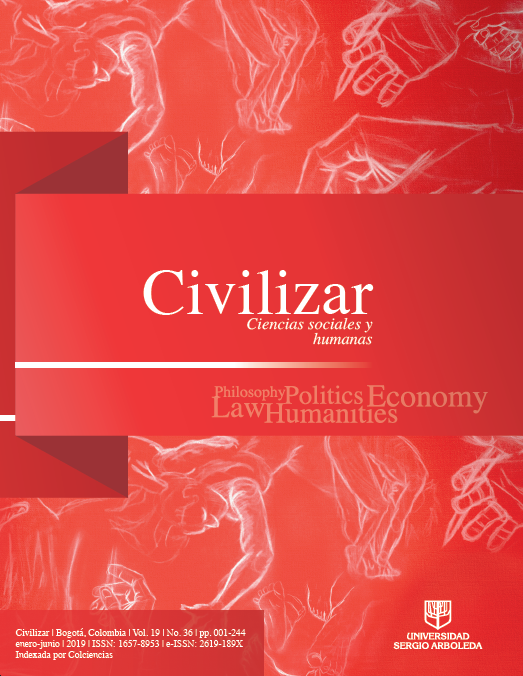Abstract
The paper exposed that mutual recognition could be approached as a translation work. The starting point is the «moving between worlds», used by Boltanski and Thévenot to refer to the subjects’ capacity to live in different «orders of worth», which Ricœur compared with the ability to translate. We examined five aspects of translation related to mutual recognition: a) its double meaning: translation between languages and translation as interpretation; b) the relationship between fidelity and betrayal; c) the training process experienced by the translator; d) the transformation of the translator’s own language; and, e) the articulation between the universality of the language and the plurality of the languages evident in the translation work.
References
Bielsa, E. (2016). Cosmopolitanism and Translation. Investigations into Experiences of the Foreign. New York, United States: Routledge. doi: https://doi.org/10.4324/9781315670843
Bolaños, S. (2016). Introducción a la traductología: autores, textos y comentarios. Bogotá, Colombia: Universidad Nacional - Universidad del Rosario.
Boltanski, L. (2014). De la crítica. Compendio de sociología de la emancipación. (Trads. T. Fernández y B. Eguibar) Madrid, España: Akal. doi: https://doi.org/10.4000/books.res.171
Boltanski, L., & Thévenot, L. (1991). De la justification. Les économies de la grandeur. París, France: Gallimard.
Contreras, B. (2012). La sabiduría práctica en la ética de Paul Ricœur . Santiago de Chile, Chile: Pontificia Universidad Católica de Chile - Plaza y Valdés.
Honneth, A. (1997). La lucha por el reconocimiento. Por una gramática moral de los conflictos sociales, (Trad. M. Ballestero). Barcelona, España: Crítica.
Honneth, A. (2012). The I in We. Studies in the Theory of Recognition (Trad. J. Ganahl). Cambridge, United Kingdom: Polity Press.
Jervolino, D. (2008). Per una filosofia della traduzione. Brescia, Italia: Morcelliana.
Kearney, R. (2010). Le paradigme de la traduction. En G. Vincent, y J. Porée (Eds.), Paul Ricœur. La pensée en dialogue (pp. 169-181). Rennes, France: Presses Universitaires de Rennes.
Ladmiral, J. R. (1994). Traduire: théorèmes pour la traduction. París, France: Gallimard. Nagel, T. (2006). Igualdad y parcialidad. Bases éticas de la teoría política. (Trad. J. Álvarez) Barcelona, España: Paidós.
Prada, M. (2014). Reconocimiento mutuo. La desmesura de una utopía. En T. Domingo y A. Domingo (Eds.), Congreso Internacional de Bioética y Hermenéutica. La ética deliberativa de Paul Ricoeur. Valencia: Hermes - Universitat de Valencia.
Prada, M. (2015). La idea de reconocimiento en el Hegel de Jena. Una lectura con Paul Ricœur. Franciscanum, LVII(163), 21-49.
Prada, M. (2017). Entre disimetría y reciprocidad. El reconocimiento mutuo según Paul Ricoeur. Bogotá, Colombia: Aula de Humanidades - Editorial Bonaventuriana.
Ricœur, P. (1990). Soi-même comme un autre. París, France: Seuil.
Ricœur, P. (1995). Le juste. París, France: Esprit.
Ricœur, P. (2000). La mémoire, l'histoire, l'oubli. París, France: Seuil.
Ricœur, P. (2001). Le juste 2. París, France: Esprit.
Ricœur, P. (2004a). Parcours de la reconnaissance. Trois études. París, France: Stock.
Ricœur, P. (2004b). Sur la traduction. París, France: Bayard.
Steiner, G. (2001). Después de Babel. Aspectos del lenguaje y la traducción (3.ª Ed.) (Trads. A. Castañón y A. Major). México: Fondo de Cultura Económica.
Taylor, C. (2009). La política del reconocimiento. En C. Taylor y A. Gutmann (Eds.), El multiculturalismo y la “política del reconocimiento” (2.ª Ed.) (Trans. M. Utrilla, L. Andrade, y G. Vilar) (pp. 53-116). México: Fondo de Cultura Económica.
Todorov, T. (2005). Nosotros y los otros. Reflexión sobre la diversidad humana (4.ª Ed.). (Trad. M. Mur). México: Siglo XXI.
Woodsworth, J. (Ed.) (2018). The Fictions of Translation. Amsterdam - Philadelphia: John Benjamins Publishing. doi: https://doi.org/10.1075/btl.139

This work is licensed under a Creative Commons Attribution-NonCommercial-NoDerivatives 4.0 International License.
Copyright (c) 2019 Journal Civilizar Ciencias Sociales y Humanas


